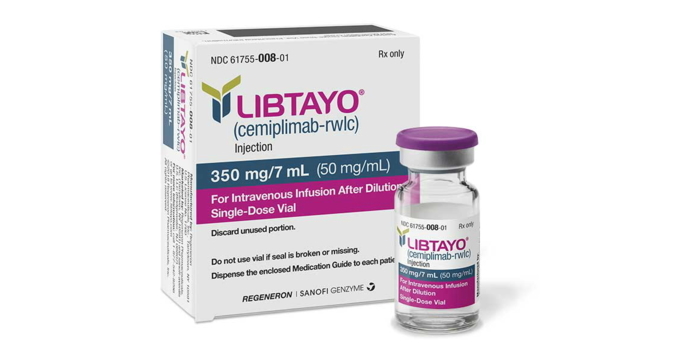FDA sets Feb decision date for Libtayo lung cancer challenge to Keytruda

The FDA has started a priority review of Regeneron and Sanofi’s checkpoint inhibitor Libtayo in first-line non-small cell lung cancer (NSCLC), based on data they hope will carve out a niche for the drug in a highly-contested market.
PD-1 inhibitor Libtayo (cemiplimab) impressed oncologists earlier this year with results from a trial in previously-untreated NSCLC patients whose tumours had high levels of the PD-L1 biomarker, showing the drug reduced the risk of death by 32% compared to platinum chemotherapy.
Updated results from the study reported at the ESMO congress in September showed that among patients with confirmed PD-L1 expression of 50% or more – the patient group targeted in Sanofi and Regeneron’s marketing application – the mortality rate was reduced by 43%.
If the FDA cleared Libtayo by its deadline of 28 February, the drug will join the clutch of checkpoint inhibitors vying for a slice of the first-line NLSCLC market, nipping at the heels of Merck & Co/MSD’s mega-blockbuster Keytruda (pembrolizumab), the undisputed class leader in this form of lung cancer.
Libtayo is also under review by the EMA as a treatment for treatment-naïve NSCLC patients with PD-L1 expression of at least 50%, with a decision expected in the second quarter of 2021, according to Sanofi.
Libtayo was the sixth PD-L/PD-L1 inhibitor to reach the market, starting out as a therapy for an uncommon skin cancer called cutaneous squamous cell carcinoma (CSCC), but Sanofi and Regeneron are seeking to expand its use into first-line NSCLC as well as basal cell carcinoma (BCC), another form of skin cancer.
At the moment, the annual net sales of these drugs across all indications are around $25 billion, but about half of that comes from NSCLC, which means even a minor share of that market would be a big step up for Libtayo. Regeneron reported sales of the drug were around $155 million in the first half of 2020.
Keytruda is used mainly in combination with chemo in first-line NSCLC, based on trial data showing a 51% reduction in death versus chemo alone – although it is also approved as a monotherapy – and has the advantage that it can be given to patients regardless of their PD-L1 status.
Sanofi and Regeneron are hoping that the impressive mortality data from their trial will allow Libtayo to vie for selection as treatment for higher PD-L1 expressors, but other rivals are also in the mix.
Bristol-Myers Squibb’s combination of PD-1 inhibitor Opdivo (nivolumab) and CTLA4 inhibitor Yervoy (ipilimumab) has now been approved by the FDA for two front-line NSCLC indications, both in May.
It was cleared as a monotherapy for patients with PD-L1 levels of 1% or more, and with “limited” chemo in all patients regardless of PD-L1 status, provided they have no EGFR or ALK mutations, which can be treated with targeted drugs.
Meanwhile, Roche’s PD-L1 drug Tecentriq (atezolizumab) has also picked up two approvals from the US regulator, one for the drug on its own in patients whose tumours express PD-L1, and a second alongside chemo in ‘all-comer’ patients with no EGFR or ALK mutations.












